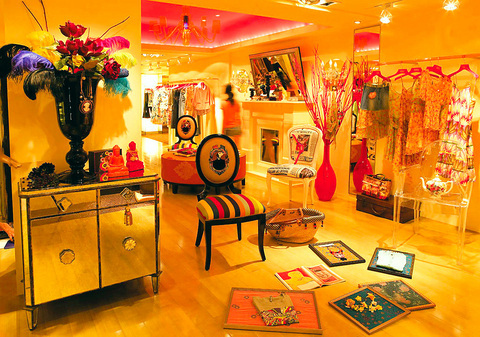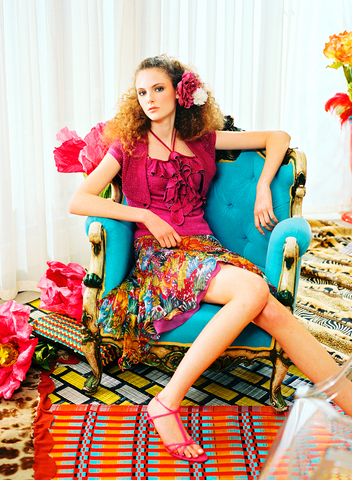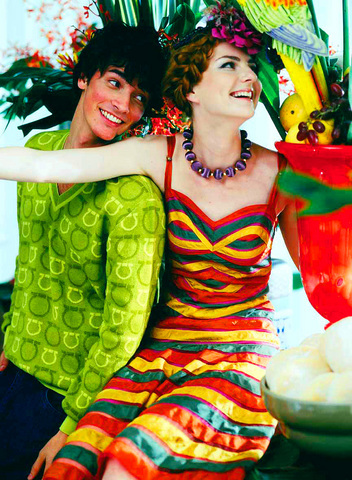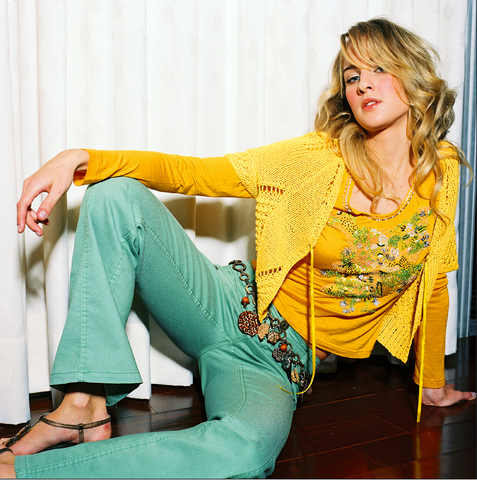Looking good comes naturally to one of Taiwan's leading young designers, Robyn Hung (洪英妮).
"When I was little we used to go on family trips and my mother used to look at us before we went out. She looked up and down and then often said, `Now go back and change.' It was a natural part of being the daughter of a successful designer."
Though she briefly toyed with the idea of opening an old people's home, Hung has been trying to find her own way in the world of fashion since then.

Petite, pretty, 30 years old and in charge of her own fashion house that has around 20 outlets in Taiwan and China, Hung would appear to have it all.
She was sent to Canada, for a foreign education at the age of 15 and learned to look after herself there. She named herself Robyn because the bird heralds spring and is a harbinger of good news.
"The idea of looking after old people folded and then at 16 I thought I could do anything. In Toronto I wanted to see the world rather than study. I kind of fell into fashion," Hung said.

PHOTOS: COURTESY OF ROBYN HUNG
She studied in Britain at the London College of Fashion. "I really hated it at first because they don't teach, you have to do what you do and then they judge you. It was completely different to everything I was used to."
After graduating, Hung worked with trend forecasting companies in Europe before returning to Taiwan and joining the family business. Her mother, Joyce Su (
"She's an amazing woman. She's always improving herself and others," Hung said. "She didn't come from a wealthy family and worked really hard to get where she is today. Of course she has helped and inspired me."

On the other hand, "When you feel fortunate it's like a guilty feeling and you have to do more to give something back."
Hung is conscious of high family expectations and is obviously ambitious as a result. In addition to becoming a publisher and expanding her own label, as well as helping her mother's business, she opened Robyn Hung Boutique on Zhong-zheng Road in Tienmu last year to develop the idea of fashion as more than just clothes.
The boutique is inspired by the street markets of London and Paul Smith's store in Convent Garden, which displays only goods the designer likes. It's like a one-stop shop for dressing oneself and decorating your home. Style is everything and fashion becomes somewhat secondary.

Robyn Hung's boutique offers home furnishings, cosmetics, antiques, ceramics and accessories, as well as her latest collections. You can drop in for tea and a chat with a design consultant or get an eye for the latest trends.
Her most recent show was inspired by Africa, Morocco, Victor-iana and her upcoming wedding. The clothes had her signature style that mixes European ideas of fun and individuality with Taiwanese concepts of innovation and cuteness.
An example of this is a white T-shirt with epaulettes, which has a picture of a British bulldog wearing a crown, adorned with sequins and a necklace of pearls. It's a real fusion item of clothing that shows no fear of influences.
The concept of keai (
According to Hung, zhuang keai (to make oneself cute) is a positive energy. It's good to look cute. It makes people happy. It's not like in the West, where it's just for kids. You don't need to look tough. Cute and successful is even more adorable."
Other trademark Hung designs include combining old and new, Victoriana with the street, denim with lace -- adding two big pockets to a stylish cocktail dress. She wants to promote a look that is Audrey Hepburn for the 21st century and keep introducing foreign cultures.
Hsieh Yung-hsu (謝詠絮), a lecturer in the fashion design department at Shih Chien University (實踐大學), was impressed by the energy of Hung's show last weekend but said it was "fashion as a statement rather than as clothes."
"When I see her work I feel it's European and fun. You can create your own style by mixing and matching. That's what I find so attractive and makes her one of our leading young designers.
"There is a growing stage in Taiwan, and you don't always have to be successful from a selling point of view these days. A designer can have just one store and still have a big influence."
Though fashion is obviously central for Hung, it's not everything and at one point in our interview she said it was not important.
"I'm not trying to be fashionable. Some of our customers don't understand this. I'm just giving them something they don't know, bringing a new culture or look. What I like about fashion is that there is no prejudice and everything is good if you know how to put it together."
As for the business of fashion, Hung was ambivalent and described her job as taking money from people who are able to give it away.
"Money is just a figure. But it's important, otherwise you can't do good things. The numbers have to look good. The good thing about making money is there are thousands of good ways of giving it back."
She then talked about a local motivational group, Round Table, that has helped her come to terms with success and appreciate people more.
"In the beginning it was always very important for me to be successful, but that doesn't make you happy. I was always chasing something. The important thing is not money, it's people."
Hung said she is already working on her next fashion show, which will have a fairy tale theme. She's also thinking of ways to return the fortune she has been favored with and may open an old people's home after all, through her charity work.
"I don't want to talk about it any more, I just want to do it."

On April 26, The Lancet published a letter from two doctors at Taichung-based China Medical University Hospital (CMUH) warning that “Taiwan’s Health Care System is on the Brink of Collapse.” The authors said that “Years of policy inaction and mismanagement of resources have led to the National Health Insurance system operating under unsustainable conditions.” The pushback was immediate. Errors in the paper were quickly identified and publicized, to discredit the authors (the hospital apologized). CNA reported that CMUH said the letter described Taiwan in 2021 as having 62 nurses per 10,000 people, when the correct number was 78 nurses per 10,000

As we live longer, our risk of cognitive impairment is increasing. How can we delay the onset of symptoms? Do we have to give up every indulgence or can small changes make a difference? We asked neurologists for tips on how to keep our brains healthy for life. TAKE CARE OF YOUR HEALTH “All of the sensible things that apply to bodily health apply to brain health,” says Suzanne O’Sullivan, a consultant in neurology at the National Hospital for Neurology and Neurosurgery in London, and the author of The Age of Diagnosis. “When you’re 20, you can get away with absolute

May 5 to May 11 What started out as friction between Taiwanese students at Taichung First High School and a Japanese head cook escalated dramatically over the first two weeks of May 1927. It began on April 30 when the cook’s wife knew that lotus starch used in that night’s dinner had rat feces in it, but failed to inform staff until the meal was already prepared. The students believed that her silence was intentional, and filed a complaint. The school’s Japanese administrators sided with the cook’s family, dismissing the students as troublemakers and clamping down on their freedoms — with

As Donald Trump’s executive order in March led to the shuttering of Voice of America (VOA) — the global broadcaster whose roots date back to the fight against Nazi propaganda — he quickly attracted support from figures not used to aligning themselves with any US administration. Trump had ordered the US Agency for Global Media, the federal agency that funds VOA and other groups promoting independent journalism overseas, to be “eliminated to the maximum extent consistent with applicable law.” The decision suddenly halted programming in 49 languages to more than 425 million people. In Moscow, Margarita Simonyan, the hardline editor-in-chief of the